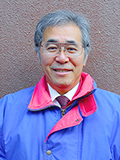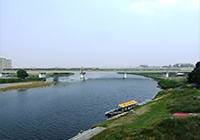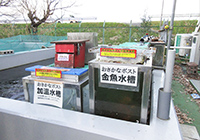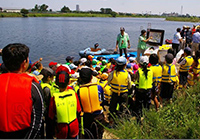
Kanagawa
Award summary
The Tama River runs along the border between Tokyo and Kanagawa Prefectures. Adjacent to the river, a water tank called the Osakana Post was set up in a pond within Inada Park (Tama-ku, Kawasaki) in 2005 to receive unwanted ornamental fish to protect the ecosystem of the river.
Mitsuaki Yamasaki, a local environmental consultant, takes care of the Osakana Post. More than ten years ago, he was conducting an environmental investigation at the riverbank when he met a boy. The boy, who was crying, was carrying a bowl containing a goldfish, which his parents had told him to dump. Yamasaki, who could not bear to watch the boy, decided to keep the goldfish in a pond in Inada Park managed by Kawasaki Kasen Gyogyou Kyodo Kumiai (Kawasaki River Fishery Cooperative), to which he belonged.
Since long ago, many unwanted ornamental fish had been dumped into the Tama River, and the number of non-native species had been increasing. Moreover, the further developed sewage system in recent years had improved the water quality, but on the other hand the warmer treated sewage effluent had caused a higher water temperature, making it more comfortable for tropical fish to live in. Some dubbed it the "Tamazon" instead of the Tama River. Yamasaki feared that if this went on, indigenous species would be eaten up and the ecosystem would be destroyed. He thought that if there was a pond for receiving fish, it could prevent foreign species from being released into the river. This was how the Osakana Post came into being.
About 10,000 fish have been dumped into the tank each year, totaling over 100,000 fish in the past ten years since the installation of the post. According to him, alien species are now scarcely seen around Inada Park. However, the Osakana Post should not be seen as a trash tank for fish; it is a place in which to keep important fish until they find a new owner. "This is a place where we maintain their lives and pass them on to the next owner. The Osakana Post should serve to 'relay' life," said Yamasaki. He has also continuously looked for new owners, and he now has an extended owner list, including elementary schools, welfare facilities, elder care facilities, and aquariums as well as individuals. He assists with 100 to 200 adoptions each year. In particular, some 300 elementary schools nationwide support the activity today, and take advantage of this opportunity to provide students with environmental education such as breeding.
Yamasaki, who used to play in the Tama River as a child, is fond of the river and has learned what nature is through the river. In the hope that the younger generations will also know the charm of the river and learn how important nature and life are, he also works hard on other activities, including a delivery class, a travelling aquarium, cleaning up around the river, and water safety education. He believes that all these missions will make a change to the current situation of the Tama River, which is still home to over 200 non-native species.



Reasons for this award
While working on the unique initiative of the Osakana Post for ten years, he is also engaged in educational activities, such as playing in the river and storytelling about the environment with pictures, through which children have opportunities to think about the environment and life. We feel that this multilateral approach represents his deep feelings toward the Tama River. All his energy and actions originate in his happy memories of his boyhood days with his family in the Tama River, as he hopes that today's children will also have pleasant memories of the river. We are deeply touched by his conviction that a chain of happiness will lead to true environmental protection.
Comments from the winner
I am full of gratitude and surprise that I have received such a prestigious award. I have protected the ecosystem of the Tama River, and at the same time, I have continued the Osakana Post project to pass life on, hoping to save the lives of abandoned non-native fish. The activities to keep fish in the post and find new owners have brought about a drop in the populations of tropical fish and other invaders in the river around the post, which has totally alleviated the adverse effects on the ecosystem. I teach children that protecting nature will tell them how important life is. I will continue the "relay of life."






